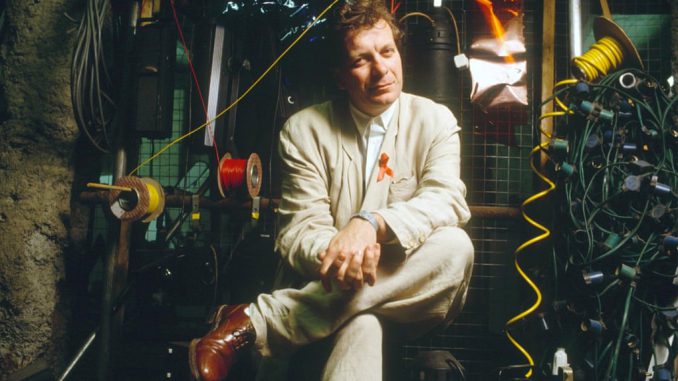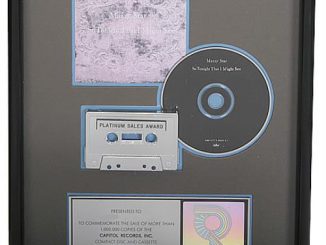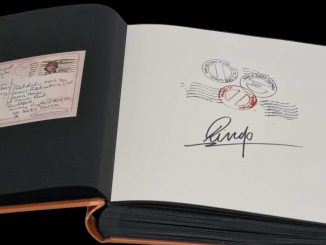
From Miranda Sawyer @ The Guardian
The music journalist’s celebration of the TV presenter turned Factory Records kingpin captures the energy and intelligence of a complex but inspiring man
There’s a Jeremy Deller artwork, The History of the World 1997-2004, which connects acid house with brass bands. It does so via long, looping arrows and scrawled words such as “Throbbing Gristle”, “privatisation” and “the miners’ strike”; a visual mind map of connections between outsider music, local culture and political movements. Paul Morley’s detailed, epic book about the life of Tony Wilson is like that artwork.
Actually, if you could zoom into the area of Deller’s artwork that ticks off “the north”, “Gerald”, “808 State” and, of course, “the Hac” (the Hacienda nightclub), then this book would be there, mapping the particular network that joins all these entities and others, moving between the past and the present, and showing Wilson as a vital hub.
Wilson, who died in 2007, aged 57, of a heart attack (he had been undergoing treatment for kidney cancer), was a Manchester star. A local TV presenter, non-money-making entrepreneur, relaxed music manager and, as it says on his gravestone, “cultural catalyst”, he created Factory Records with a group of friends in the late 1970s. It brought out albums by Joy Division, New Order, Happy Mondays, the Durutti Column, A Certain Ratio, all labelled with a FAC (or FACT) catalogue number. It also catalogued a trip to Russia (FAC 126), and the Hacienda (FAC 51). Wilson’s coffin, the last ever Factory number, was FAC 501.
Wilson, through his energy and ambition, his ability to effect change, altered many people’s lives, including mine. Also Morley’s, who writes honestly about a complicated man who was as intimidating and selfish as he was inspiring and fabulous. A respected music writer, producer and manager who began by creating his own fanzine in late 70s Manchester, Morley is some years younger than Wilson. They knew each other through the local music scene and some time in 1977, Wilson pops round to Morley’s family home to see if he is in. He isn’t, but Morley’s mum is beside herself. Telly celebrity Tony Wilson is in her home! He tries to help her fix a leaky tap, tells her his technique for making mashed potatoes. “My mum smiled about the day Tony visited for the rest of her life,” writes Morley. He also writes this: “I don’t believe I ever had a comfortable face-to-face conversation with him, because I wasn’t sure if he was playing a game I didn’t know the rules of.”
It took Morley 10 years to complete this book and there’s a lot in it. Fifty-one chapters, three sections: the central, shortest part is, cleverly, about the Sex Pistols’ 1976 gig at Manchester’s Lesser Free Trade Hall, the one attended by around 40 people, whose lives were changed because of it. Morley was there. Wilson said he was there, too, though Morley doesn’t remember him. It doesn’t matter.
Morley is great at capturing the almost incomprehensible power of a single gig, of how, six weeks later, when the Pistols play again, the audience have all cut their hair, tightened their trousers, altered their attitude. He understands how punk changed Wilson’s life, diverted him from becoming, as he says, “an amiable mainstream national figure, even a treasure”; how it “rekindled the radical teenage rebel inside him, and it never really let him go”. He’s also fantastic at evoking the atmosphere of a time (especially the grim 1970s) and how a city’s history affects all those who live there. He has a way with a list, and starts each chapter with one that describes Wilson at that moment. He writes as only he can, in long, descriptive, flowery sentences, each a mind map in itself.
Sometimes all this detail pulls focus away from Wilson; sometimes Morley’s brilliance pinpoints him exactly. The part of Wilson’s life that usually gets the most attention – the Factory years – takes up around a third of the book. His Granada TV period is treated with respect. The later chapters concerning Wilson’s illness and death are very affecting, especially the verbatim interviews with his friends and his two children.
One of the things that was so exciting about Tony Wilson was that he assumed that you were clever (though not as clever as him). He engaged in lively argument with everyone, from Morley himself to Richard Madeley (“I remember him saying: ‘OK, you’re fucking right… But I’m fucking right as well and that’s where we’re going to leave it, right?’”). And Wilson’s energy lasted: Manchester’s new squares and skyscrapers exist partly because of it. One is even named after him.
From Manchester With Love is like Wilson in that it assumes the same of its reader: intelligence, bloody-mindedness, a romantic, revolutionary soul. It requires concentration, mixing, as it does, careful interviewing with flights of fancy, revealing detail with time-travelling description. More than a mind map, the book’s peculiarity and expanse and, yes, love, means it becomes an immersive experience. I found it very moving indeed.
Buy the book here
Discover rare & collectable Factory Records on Vinyl & CD at eil.com here
eil.com – the world’s best online store for rare, collectable & out of print Vinyl Records, CDs & Music memorabilia since 1987




Be the first to comment